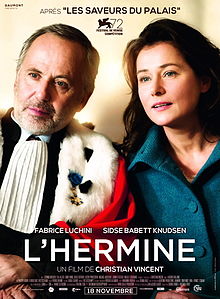
COURTED/ L’HERMINE
France, 2015, 98 minutes,.Colour.
Fabrice Luchini, Sidse Babette Knudsen.
Directed by Christian Vincent.
Courted is an interesting and entertaining French film about a judge and the justice system as well as his personal character and his infatuation with a witness.
Fabrice Luchini, veteran of French films for many decades from films by Eric Rohmer to In the House, plays a very strict judge, ritual in his entry in the court and his conduct of proceedings, considered by other lawyers as a kind of hanging judge. Into his court, comes a case where one of the witnesses is a woman, a nurse, who looked after him in hospital when he had an accident some years earlier and with whom he becomes infatuated.
During the trial, he has meals with the woman, advancing his own cause, she sympathetic but being very careful. Also in the action is the woman’s 17-year-old daughter who has a more relaxed attitude towards life and relationships.
The woman is played by Sidse Babette Knudsen, star of the popular Danish television series Borgen, was one of the two central characters in The Duke of Burgundy and appeared in the Dan Brown’s story, Inferno.
1. Legal and judicial film, a drama, personal stories? The blend?
2. French provincial town, the courts, the judge’s rooms, restaurants, hospitals? Authentic feel? Musical score?
3. The title? The English translation and its play on words?
4. The case, the death of the infant, the killing of the infant? Who? How? One covering for another? The unemployed father, the slow wife, the police, interrogation pressure, eliciting the confession? The inconsistencies? The denial? The court, the defendant and his single line that he was innocent? The wife not remembering detail? The range of evidence presented, the selection of the jury, their personalities, the possibility of asking questions? The judge’s comment about justice and the law being upheld, whether the defendant was found guilty or not?
5. Judge Racine, Fabrice Luchini and his screen presence? His age, experience, separation from his wife, his apartment, the story of his accident, being in hospital, being looked after by Ditte? In the court, his reputation, sentencing people severely, the gossip about him, his fall in the street and the interpretation, his having the flu, dependent on his secretary, going to the doctor, the consultation, injections, pills and warnings? His travelling case and his walk to and from the court?
6. The ritual, being referred to as the president, lining up, the robes, the bell, entering – a piece of theatre?
7. Justice, the case, the role of the judge, the defence lawyer, the prosecutor, the role of the jury, sitting up with the judge and his advisers, the process of selection, the different characters, their opinions, able to ask questions? The judge and his giving advice? The vote?
8. The range of proceedings, the role of the judge, his interventions, demands, having breaks?
9. The jury, their meetings, the different types, men and women, racial backgrounds, the discussions, presumptions, jokes, being serious?
10. The judge sending the note to Ditte, memories of the past, going to the restaurant, having drinks, the discussions, memories of the hospital, the judge and his dependence on Ditte, falling in love, the effect, the to and fro of their conversation? Her liking him? Tensions, appropriate behaviour or not? The return to the restaurant, Ditte’s daughter present, cavalier attitude, criticisms of the proceedings, being in the court, getting phone messages and texts and ignoring the judge and his explanations?
11. The scene of Ditte at home, her daughter, 17 years old, their banter, the discussions about the case, the daughter wanting to know about it, what people were wearing? Ditte and her reaction?
12. The defence lawyer, seemingly cavalier, his speech against the investigating officer?
13. The investigating officer, given a hard time and cross-examined by the judge?
14. What the audience was left with in terms of French Justice, judicial proceedings, the role of the judge, the defendant, witnesses, the administration of justice? And the personal story?